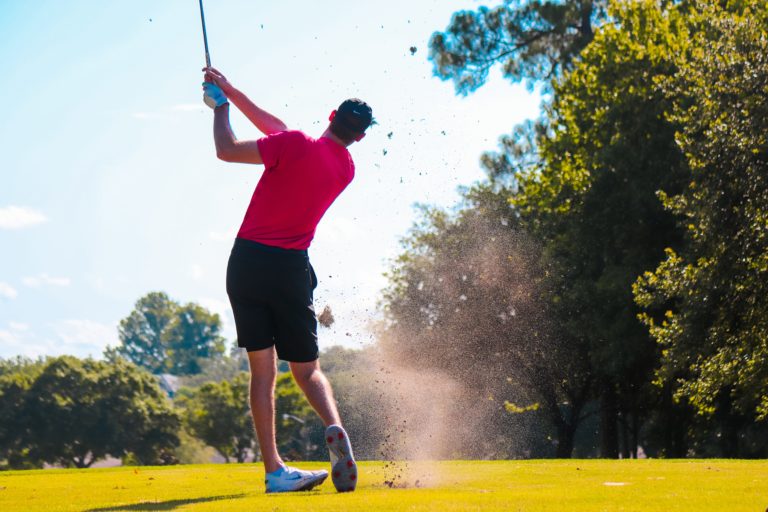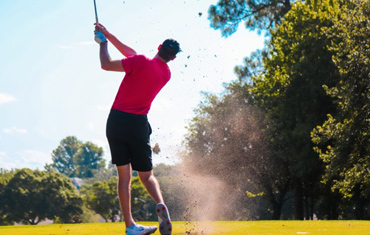Picture this: you’re rounding off your best year of golfing yet—five consecutive tournament wins to date. Suddenly, you suffer from a rotator cuff injury on your left shoulder blade. In spite of all odds, you power through the pain and go on to win the World Golf Championships-American Express with a total of 23 under.
Pretty impressive, right? That’s exactly what happened to Tiger Woods at the height of his career in 2006. While most golfers don’t go on to win world championships, many have at least one thing in common with Tiger: shoulder pain from golf.
In fact, it is estimated that up to 18% of all golf injuries are shoulder-related. Let’s explore the science behind shoulder injuries in golf and the most common methods for prevention and treatment.
Golf Shoulder Pain Explained
A common misconception about golf is that it’s a sport with a near-zero risk for injury. This is far from the truth–when compared to sports like rugby and hockey, the likelihood of injury is actually higher.

But what makes golfers so injury-prone? While golfing is indeed a low-impact sport, the opportunities for overuse and poor technique are immense. Amateur golfers are more than twice as likely to develop injuries when compared to professional players.
For all golfers, the act of swinging can place a large amount of stress on the shoulder’s surrounding muscles, connective tissue, and tendons. This stress on the shoulder is partially due to the limited pelvic rotation that takes place during the swing. With repeated use, the resulting damage to the shoulder components can lead to injuries such as rotator cuff tears—rips in the muscles that help stabilize the shoulder joint.
How to Prevent Shoulder Injuries from Golf
For players looking to avoid sitting out for the season due to painful injuries, prevention is critical. Below are a few key things to consider:
- Make sure to practice good form: Repetitive instances of improper form and technique can increase the likelihood of sustaining a shoulder injury. Improper form can present itself in many ways—from having a weak grip on the club to swinging too hard. Make sure to always practice proper form and ask for help/training from more experienced players if necessary.
- Use the right equipment: Club length and weight are important factors to consider when choosing the right equipment. Always choose equipment that’s not too heavy and that you feel comfortable using regularly.
- Be mindful of overuse: When swinging, pay extra attention to how your shoulder feels. If you begin to feel discomfort, consider sitting out a few rounds until the pain stops.
Common Shoulder Injuries and Treatment Options
If you’ve taken all the necessary precautions and still find yourself experiencing shoulder pain, then a visit to a specialist is the best route for a proper diagnosis and treatment plan. Common shoulder injuries and their associated treatment plans can include the following:
- Rotator Cuff: One of the most common golf injuries is a tear of the rotator cuff. Depending on the severity, a conservative treatment plan might be prescribed. Treatment for a rotator cuff injury often involves a combination of at-home stretching exercises, pain medications, and physical therapy.
- Shoulder Instability: Another common shoulder injury from golf is instability. Shoulder instability is when the ball of the shoulder joint shifts either partially or completely out of the socket due to excessive stretching or tearing. In some cases, shoulder surgery is recommended to tighten stretched ligaments and restore joint stability.
- Frozen Shoulder: For golfers suffering from frozen shoulder— a painful condition causing stiffness in the shoulder joint— treatment can include over-the-counter nonsteroidal anti-inflammatory drugs (NSAIDs) and physical therapy.
Don’t Let Shoulder Pain Stop Your Swing
Do you have recurring or unexplained shoulder pain? Consider scheduling an evaluation with Dr. Van Thiel. As a leader in orthopedics and sports medicine, Dr. Van Thiel has extensive experience working with patients who suffer from golf-related injuries such as shoulder impingement and instability.
Call the office of Dr. Van Thiel at or request an appointment at the Rockford practice today.





